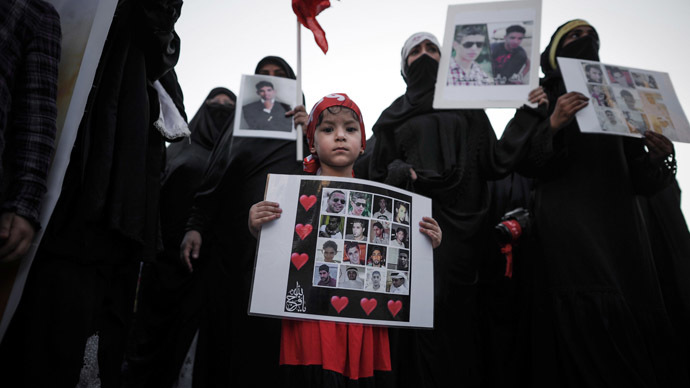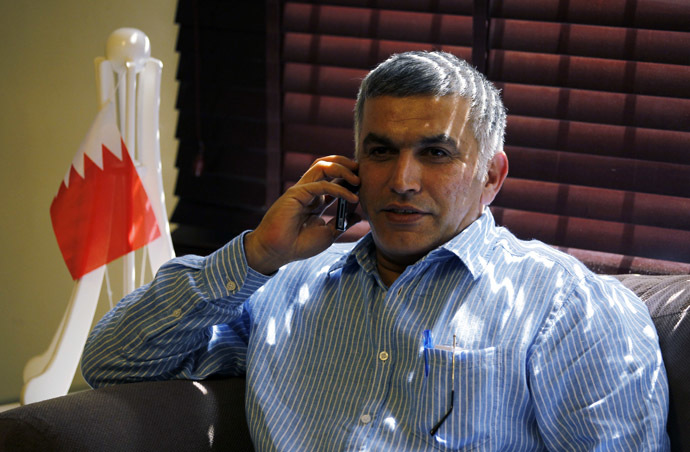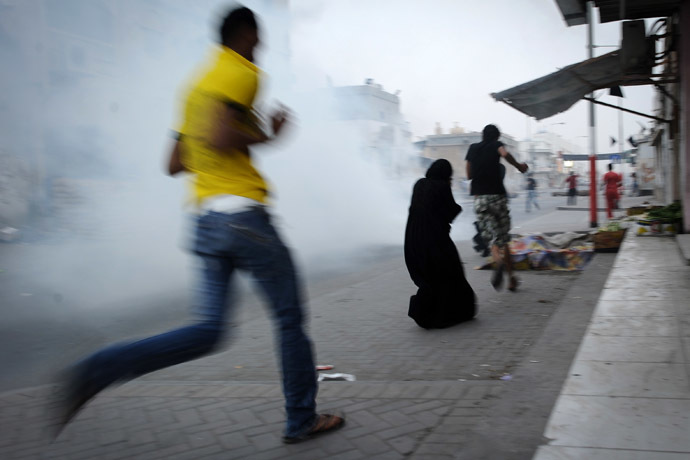Bahrain will release political prisoners ‘only if pressured by US and UK’

The most well-known political prisoner in Bahrain, Nabeel Rajab, has become legally eligible for release, but remains behind bars. Bahrain Watch’s, Bill Marczak, believes the activist is unlikely to be freed unless the US and the UK insist.
As of November 29, Nabeel Rajab, a prominent Bahraini human rights activist, served three quarters of his 2-year prison term, which means he may be released. He was detained in July 2012 for taking part in an anti-government protest.
Amnesty International has called for Rajab’s immediate release.
“A failure to release Nabeel Rajab on Friday would make it
crystal clear that his imprisonment is not about justice or the
law but about silencing him,” said Hassiba Hadj Sahraoui, the
watchdog’s Middle East and North Africa Deputy Director.
Bahrain Watch sees the release of political prisoners as
something that would help the country move toward solving its
political crisis. However, Bill Marczak, a founding member of the
organization, told RT that Bahrain could only be pressured into
doing so by its Western allies.
This comes as a group of British and American rights lawyers, gathered by Bahrain Watch, are taking legal action to prevent a South Korean firm from supplying the Bahraini authorities with over 1.6 million rounds of tear gas.
RT: Will authorities free Nabeel Rajab now?
Bill Marczak: It’s hard to say. I think probably the government will release him only if there is significant pressure from Bahrain’s allies, meaning the United States and the United Kingdom. In the absence of that pressure I think the government will still try to keep him in prison in line with their campaign of trying to prevent any sort of dissent.

RT: There's a lot of international criticism of Bahrain's anti-protest tactics. Do you think pressure from outside the country could really change Rajab's fate?
BM: That’s definitely difficult to say. I think, you know,
certainly, in the mainstream press, in what’s going on in front
of the scenes, we have not seen this pressure. Perhaps, behind
the scenes the United States and the United Kingdom might exert
this pressure, but it’s hard to say what exactly is going to go.
RT: The Gulf kingdom uses tear gas in abundance. Do you really think your campaign will stop it being used?
BM: Yes, I think definitely our campaign has a good chance
of success. So far what we’ve done is to get the campaign started
when we leaked a tender document from the Ministry of Interior in
Bahrain, showing that they were planning on purchasing more than
1.6 million rounds of tear gas and of course this is more than
Bahrain’s entire population of 1.3 million. So the release of
this kind of document gave initial momentum to our campaign and
ever since then we’ve been focusing on having protests, putting
pressure on the Korean DAPA, which is the export licensing
authority there, as well as the ministry of foreign affairs. And
we’ve been very fortunate that people in Korea have taken up this
cause alongside us. And we had a protest a couple of weeks ago
with 31 Korean NGOs calling on the government to stop the
shipment. So, I think the campaign definitely has a good chance
of success and I’m optimistic.
RT: But Bahrain says it's using tear gas 'appropriately' and that the police use 'less force than legally permitted'. How else should they react when attacked daily by petrol-bombs?
BM: We don’t have a problem and I don’t think anyone has a problem with the correct use of tear gas to disperse violent rioters. What we’ve seen in Bahrain though is exactly the opposite of this. You can look at this just by looking at the sheer size of the tender – 1.6 million canisters. We heard that the South Korean company, who’s exporting this – Daekwang Chemical corporation – previously exported 1.5 million [canisters] in 2011 and 2012 and we saw daily videos of night time bombardments of villages in Bahrain with tear gas. These are areas where there are no protests whatsoever going on. The government just comes in and fires massive amounts of tear gas to punish citizens for expressing dissent or earlier protests.

So we are not seeing the use of tear gas in Bahrain to disperse
violent rioters as much as we are seeing it as a weapon of
collective punishment. So, that’s our main problem with the
government’s use of tear gas. Statistics that have been
compiled by the Physicians for Human Rights – an NGO – shows that
39 deaths in Bahrain may be attributable to the government’s use
of tear gas.
RT: What's your view on how the country should solve this current crisis?
BM: It’s definitely a difficult situation that’s going on
in Bahrain. I think the government can take some steps to solve
the crisis. First and foremost, the government should release
political prisoners. Nabeel Rajab is just one example. There’s
dozens and dozens of other political prisoners, human rights
leaders, etc. And I think the release of these prisoners will
definitely have a positive impact on the situation. We’ve seen
the government try to halt the so-called national dialogue with
the opposition. You can’t really have this dialogue, when there
are so many political prisoners and major players in the
opposition in prison.
RT: Why hasn’t this crisis received massive coverage in the Western media outlets?
BM: In terms of the issue of Bahrain not being covered by
other news channels, I think there’s a lot of politics around the
issue. As well as it’s hard to find a good angle on this. With
respect to the Western media, CNN, the BBC… they do a bit of
coverage, but by and large there’s no really appealing angle for
them to cover, in terms of balancing the US and the UK position
with the reality on the ground.
The statements, views and opinions expressed in this column are solely those of the author and do not necessarily represent those of RT.
The statements, views and opinions expressed in this column are solely those of the author and do not necessarily represent those of RT.












